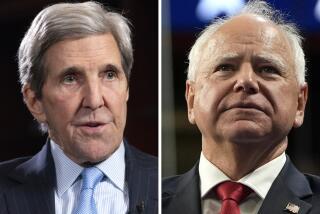The GOP, a casualty of war
- Share via
Haven’t been paying close attention lately? Then you might be forgiven for assuming that the phrase “the war” refers to the battle being waged between Barack Obama and Hillary Clinton for the Democratic presidential nomination, rather than the events taking place in Iraq. Even with Gen. David Petraeus testifying on Iraq before Congress this week, most media commentary focused less on analyzing what’s happening in Iraq and more on how Obama and Clinton used the hearings to jockey for preeminence.
During the first three months of 2008, the Pew Research Center found that “coverage of the campaign outstripped coverage of the war by a margin of more than 10 to 1,” and that most of that coverage focused on the Obama-Clinton battle. That’s because the war -- the real one in Iraq -- is kind of a downer, whereas the purported civil war within the Democratic Party is fun and exciting.
Much like the Iraq war, the Democratic primary race has involved the levying and spending of unprecedented amounts of money, as well as huge strategic blunders by a leadership team that boasted years of experience. At the same time, the Democratic race is unlike the Iraq war in ways that make it far more enjoyable to cover: The blood is only metaphorical, and there’s plenty of juicy insider gossip (Mark Penn, anyone?).
Finally, much as the Democratic presidential nomination process sometimes feels like a quagmire, there is a withdrawal timetable. By the end of August, someone’s forces will have abandoned the field entirely, and we’ll have a clear winner.
Would that Iraq were so simple!
Although Democratic Party infighting makes good copy, the intense media focus on the Obama-Clinton battle obscures the fact that it’s the Republican Party that’s in deep doo-doo. The very factors that make us wish we could forget about the war in Iraq are driving a seismic shift in the American political landscape: the likely reversal of years of GOP electoral dominance.
Much as we try to repress it, we all know the whole sad Iraq story. False intelligence. Insufficient troops. No planning for an extended occupation. Looting. Sabotage. Insurgency. Car bombs and IEDs. Abu Ghraib. And five years later, what have we got? More than 4,000 dead U.S. troops, countless dead Iraqi civilians, no sustainable Iraqi political settlement, a U.S. military cracking under the strain, a new Al Qaeda franchise in Iraq, rising (but neglected) extremist threats in other parts of the globe and a U.S. taxpayer bill of $508 billion to date (with long-term costs in the next decade estimated to exceed $1.7 trillion). What’s more, as Petraeus acknowledged this week, there’s no end in sight.
As I said, it’s a downer.
Especially for the GOP.
Over time, as more and more Americans have become convinced that going to war in Iraq was the wrong decision, President Bush’s approval ratings have plummeted -- and Bush appears to be taking the Republican Party down with him.
According to a March 20 Pew Research Center study, Republican Party identification is at its lowest point in the center’s 16 years of polling: Only 27% of registered voters will now fess up to being Republicans, a 6-percentage-point drop since 2004. And the decline is particularly notable in key swing states.
It’s not just the fence-sitters who are shifting; core GOP constituencies are fleeing too. In a warning sign of what the future may hold for the GOP, Republican Party identification among younger white evangelicals -- 55% in 2001 -- had plummeted to 40% by September 2007.
The same trend has been true among military personnel, for decades a solidly Republican constituency. In 2004, 60% of active-duty military personnel who responded to a survey sent to Military Times subscribers identified themselves as Republicans. By 2007, that had dropped below 50%. (Military personnel tend to take screw-ups in Iraq pretty personally.)
If political contributions are any guide, 2008 has the potential to be a good year for the Democratic Party with military voters; data compiled by the Center for Responsive Politics found that the two candidates pulling in the most money from military donors in January and February were Ron Paul, the libertarian GOP candidate who favored withdrawing U.S. troops from Iraq, and Obama, who garnered nearly 30% more in military donations than presumptive GOP nominee John McCain.
A lot could happen between now and November, but at the moment, the Democrats appear poised to retake the White House and consolidate control over both houses of Congress. The economy’s tailspin may also lead voters to punish the GOP -- but for most of the last seven years, the primary driver of Democratic good fortune has been the Iraq war.
Heck of a job, Bushie.
More to Read
Get the L.A. Times Politics newsletter
Deeply reported insights into legislation, politics and policy from Sacramento, Washington and beyond. In your inbox three times per week.
You may occasionally receive promotional content from the Los Angeles Times.










